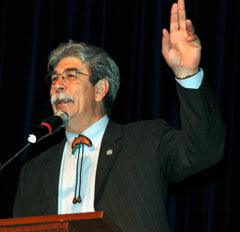TULALIP — Tulalip Tribal Chair Mel Sheldon Jr. was quick to share credit with the surrounding community for the Tulalip Tribes’ prosperity in this year’s State of the Tribes address.
Speaking to the Greater Marysville Tulalip Chamber of Commerce on April 29, Sheldon praised Chamber President and CEO Caldie Rogers and her fellow Chamber members for being “on the leading edge” of innovation. Sheldon likewise lauded Marysville Mayor Jon Nehring and his City Council for their partnership in joint economic and environmental projects.
Sheldon also credited Everett Mayor Ray Stephanson and Washington State University with working to bring a hospitality and restaurant training program to the area so that Tulalip Resort staff can receive “world-class training” locally. Sheldon touted the Tulalip Resort as already meeting a high standard, thanks in part to Resort President and COO Ken Kettler.
“Quil Ceda Village provides 4,528 jobs,” Sheldon said. “We have 2,577 team members at the Resort, 1,500 working at the Seattle Premium Outlets and 170 in Quil Ceda Village itself. That’s $120 million in wages, many of which stay right here in the community. We expect to expand the Seattle Premium Outlets, and the new Olive Garden is wildly successful.”
In addition to a new gas station at the Quil Ceda Creek Casino, Sheldon promised that the Hibulb Cultural Center’s museum would open its doors, to share the stories of the Tulalip peoples. According to Sheldon, the museum represents a $10 million investment and will serve the public this year, complete with repository artifacts and a replica longhouse.
The Tulalip Tribes are reaching out to the surrounding community not only culturally but also economically, by hosting a North Snohomish County Economic Summit with the cities of Marysville and Arlington on May 25. Sheldon added that the Tulalip Resort Casino has beaten its income projections for this past year, and expressed similar optimism for the next year.
“People say we’re a rich tribe,” Sheldon said. “We’re rich in culture, and we’ve got a great location here on I-5, but we reinvest just about everything we make into our membership.”
Sheldon explained how gaming revenues help fund Tribal members’ housing, student tutoring, health care and elder care, as well as environmental programs such as salmon recovery. He also cited the Tribes’ charitable donations to the surrounding community, which included $1.26 million to the Marysville School District in the wake of the state budget crisis.
“The Marysville schools didn’t come to us to request this,” Sheldon said. “We felt that we needed to help all the children. We appreciate our relationships with the surrounding communities. In the past, we let I-5 separate us, but that no longer holds true. We have common goals that connect us, and with those, we can create new bridges and new memories.”



